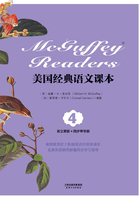
LESSON 10
THE GOOD SON
1. There was once a jeweler, noted for many virtues. One day, the Jewish elders came to him to buy some diamonds, to put upon that part of the dress1 of their high priest, which the Bible2 calls an ephod3.
2. They told him what they wanted, and offered him a fair price for the diamonds. He replied that he could not let them see the jewels at that moment, and requested them to call again.
3. As they wanted them without delay, and thought that the object of the jeweler was only to increase the price of the diamonds, the elders offered him twice, then three times, as much as they were worth. But he still refused, and they went away in very bad humor.
4. Some hours after, he went to them, and placed before them the diamonds, for which they again offered him the last price they had named; but he said, “I will only accept the first one you offered to me this morning.”
5. “Why, then, did you not close with us at once? ” asked they in surprise.“When you came, ” replied he, “my father had the key of the chest, in which the diamonds were kept, and as he was asleep, I should have been obliged to wake him to obtain them.
6. “At his age, a short hour of sleep does him a great deal of good; and for all the gold in the world, I would not be wanting in respect to my father, or take from him a single comfort.”
7. The elders, affected by these feeling words, spread their hands upon the jeweler's head4, and said, “Thou shalt be blessed of Him5 who has said,‘Honor thy father and thy mother; ' and thy children shall one day pay thee the same respect and love thou hast shown to thy father.”
STUDY GUIDE
A. Word Definition
Jeweler:someone who buys and sells precious stones.
noted:well known.
jewish:someone who practices the religion Judaism.
elders:officers of the Jewish church.
call again:return later.
object:goal.
humor:mood.
close:come to an agreement.
obliged:required.
obtain:get.
wanting:not having enough.
thy:your.
thee:you.
thou:you.
hast:have.
B. Study Notes
1. Dress: can have several meanings. Here it means all of the clothing which the priest wears. However, “dress” can also refer to one particular type of clothing with an open bottom, usually worn my women.
2. The Jewish Bible is the holy book of Judaism.
3. Ephod: part of the clothing of a Jewish priest, made of two pieces, one covering the chest and the other the back.
4. In some religions, priests or other religious leaders may put their hands on a person's head as a sign of a blessing, believed to bring that person closer to his/her God or Gods.
5. “Him” is referring to God and the statement to “honor thy father and thy mother” is one of ten important rules commonly called The Ten Commandments which form the fundamental basis of Judaism.
C. Comprehension Questions
1. Why did the elders want to buy diamonds?
2. Why did the elders think the jeweler was refusing to sell the diamonds?
3. Why did the jeweler refuse to sell the diamonds?
4. What other items do you think a jeweler would sell?
D. Retelling the story: Write a number (1-5) on each line to put the events of the story in the correct order.
____ The jeweler said he would only accept the original price for the diamonds.
____ The priests became angry.
____ The priests offered the jeweler a fair price for the diamonds.
____ The jeweler refused to sell the diamonds.
____ The priests laid their hands on the jeweler's head.